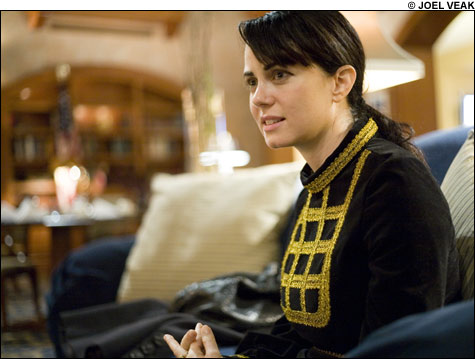
Mia Kirshner |
Best known for her role as The L Word's bookish drama fiend Jenny Schecter, Mia Kirshner is very clear about one thing: to her, acting is a "day job." Since 2001, the 33-year-old actress has devoted her extracurricular energies to I Live Here, a collage-style literary documentary of uprooted peoples in strife-torn nations that Random House released in November. The product of refugees herself (her father was born in a DP camp to Holocaust-survivors parents), Kirshner gives readers a gut-wrenching firsthand glimpse into the lives of the disenfranchised in such hotbeds of turmoil as Burma, Ciudad Juárez, Malawi, and the Russian republic of Ingushetia. With The L Word's final season debuting in January and Kirshner planning to propel I Live Here into an even more ambitious outreach project, you have to wonder what she'll be choosing as her next day job.
What was your inspiration to createI Live Here?
I felt like I was living a disconnected life, a sheltered and disconnected life. This was 7 years ago, and I just became increasingly aware of how fleeting time is, and how it's so easy to get up and go to work, and eat well — if you have that option — and to really be disconnected from what's happening in the rest of the world. So after September 11, I was just like, "I am frightened at the level of my own ignorance," because it never felt to me like these incidents happen in isolation; we're all connected and we're all affected by it. So that's the rambling answer of why the book was done.
And where did the project really start to coalesce?
From the beginning, really. You mean the format? It was never supposed to be my writing, in the book.
I had read that, yeah.
That was one of the things that did change. This book has a vision that's remained unchanged from the very beginning. The only things that changed were the creative nonfiction, my writing in it, and that it was split up into four books, but before I contacted my brilliant partners [Adbusters creators] Michael Simons and Paul Shoebridge — we did the design together, and they did the actual handwork in the book, which is painstaking. I did my own mock-up book, and a very very crude version of that.
The way that it's laid out?
Just the content. I knew that I wanted it to be their writing, and the writing of the displaced — their photographs, their art, and the ephemera that I was collecting from the camps. I wanted it to feel very intimate, and very much like a journal, and something that was radically different from a dry human rights report that you might read. It does feel very intimate. Yeah, that was the point. Because I feel that, I can only speak for myself, but the way that I've been engaged to do something is to be moved, to feel a sense of intimacy with the subject. That was why the book was done like that.
How did you go about getting your interviews? Did you just go to the places and find people to talk to?
No, there was nothing casual about this book. I mean, the book _looks_ like it could have been haphazardly done, but you can't go to these areas without a tremendous amount of research. So first of all, before the book started, there was about a year of research that went into picking the places, and then Amnesty International — for the first two places, Ingushetia and Burma — they set me up with a local human rights organization, who acted as my fixer. And then from there, through the research, I had a list of stories that I wanted to do, and possible locations. But a list is just a list. Everything changes when you get there.
Reality kicks in.
Exactly. I think it's important to know what you're doing. It's not safe otherwise. So they were the ones who set up the interviews, but we were driving into the locations. But in the camps, you don't know. In the brothels, you don't know.
What was your relationship with your translators like? You must be so dependent on them.
They're really important, translators, you know, because they're basically your eyes and ears into the situation, and I definitely learned that very quickly, especially in the beginning. Well, I had a very good translator in Ingushetia, who would literally translate every single word the subject said, even if it was grammatically incorrect, even if there were inaccuracies in what they had said, because that's for my partners and myself to decide later how to use that material. And there were other translators who — somebody could be speaking to me for like a minute, and then I would get a one-sentence translation. That's not OK, so they were let go. I would say it was the translators I was probably the hardest on. And my prerequisite was that they translate absolutely everything that the subjects say, they don't give a commentary on what the subjects say, and that they're female.